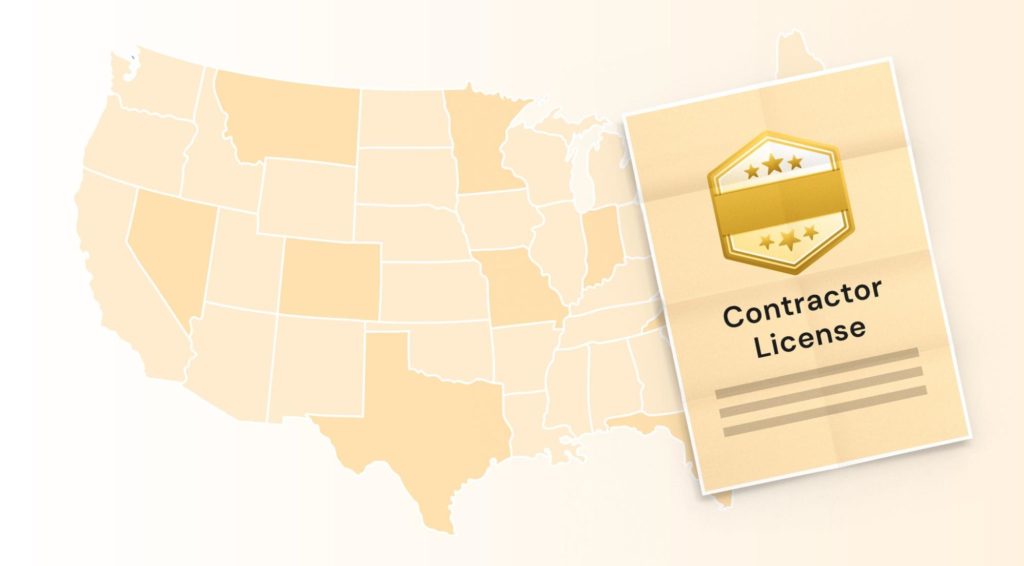A general contractor’s license serves as a crucial credential in the construction industry, demonstrating your expertise to clients and regulatory authorities. This certification represents your commitment to upholding industry standards and opens doors to larger and more profitable projects that remain off-limits to unlicensed contractors.
Many builders find the licensing process challenging to navigate. You encounter different requirements across states, need to document your work experience properly, and must prepare for technical exams. Finding precise and reliable information about these steps can often prove difficult, as requirements vary widely.
This guide covers everything you need to know about getting your general contractor license. It will answer common questions, explain key requirements, and provide steps to help you through the licensing process.
What is a General Contractor License and Why Does It Matter?
A general contractor license represents your legal authorization to manage construction projects above certain value thresholds set by state authorities. You receive this credential after demonstrating specific qualifications to your state licensing board through experience verification and examination completion. This official document validates your knowledge of building codes, safety regulations, and business practices necessary for successful project execution.
As a general contractor, you coordinate entire construction projects from foundation to finishing touches. You hire and supervise specialized subcontractors, maintain project timelines, obtain necessary permits, and ensure that all work complies with applicable building codes. Your oversight creates cohesion among various trades while maintaining quality standards throughout the construction process.
Here is why obtaining your general contractor license matters:
- Legal Compliance: You need proper licensure to legally perform construction work valued above thresholds established by state regulations. Operating without required licenses exposes you to penalties, project shutdowns, and potential legal action from regulatory authorities.
- Professional Credibility: Your license demonstrates verified expertise and commitment to industry standards that clients recognize and value. This credential distinguishes you from unlicensed competitors and establishes trust with potential clients.
- Access to Insurance & Bonds: Insurance providers require proper licensure before issuing liability policies that protect your business from financial risks. Similarly, bonding companies mandate licenses before offering surety bonds necessary for securing larger contracts and government work.
- Qualification for Bigger Projects: Government agencies and commercial developers restrict bidding opportunities to licensed contractors who meet their qualification standards. Your license grants access to these lucrative projects that typically offer better profit margins and consistent work.
Who Needs a General Contractor License?
Determining whether you need a contractor license depends on several factors related to your construction business operations and project scope:
- Project Size and Cost Thresholds: Your state likely establishes specific monetary thresholds that trigger licensing requirements when these limits are exceeded. For example, California requires licensing for projects over $500, while Texas sets thresholds based on contract amounts for different project categories and municipalities.
- Scope of Construction Management: You need a license when managing multiple subcontractors and overseeing complete project execution from start to finish. This differs from specialty trade contractors who perform specific tasks like electrical work or plumbing and require their own specialized licenses.
- Project Type and Building Category: Commercial projects typically enforce stricter licensing requirements than residential work across most states. Many jurisdictions separate residential and commercial licenses with different qualification standards, testing requirements, and insurance mandates based on project complexity.
These requirements apply to various construction scenarios including new home construction, multi-family developments, commercial buildings, and major renovation projects. Verify your specific state regulations before bidding on any substantial construction work.
What are the General Requirements for Obtaining a General Contractor License?
State licensing boards maintain standardized criteria to ensure contractor competency and protect public safety. While specific requirements vary by location, most follow similar qualification patterns.
- Age and Education Prerequisites: Applicants must typically be at least 18 years old and hold a high school diploma or a GED equivalent to be eligible for licensing. Some states waive education requirements for applicants with extensive documented work experience.
- Documented Work Experience: You need between 2-5 years of verifiable construction experience relevant to your license classification. This experience must often be certified by previous employers or licensed contractors who supervised your work.
- Examination Requirements: You must pass trade-specific and business law examinations that test your knowledge of construction techniques and legal regulations. These exams evaluate your understanding of building codes, project management, and safety protocols.
- Financial Responsibility Documentation: You require proof of general liability insurance, workers’ compensation coverage, and frequently a contractor’s bond. These financial safeguards protect clients and showcase your business stability to licensing authorities.
- Background Verification Process: You undergo criminal background checks in most states as part of the application process. Some jurisdictions restrict licensing for applicants with certain types of prior convictions, particularly those related to fraud or business misconduct.
What Documentation is Required When Applying for a Contractor License?
Licensing boards require comprehensive paperwork that proves your qualifications and financial responsibility. Here are some of the documents you must submit with your application:
- Licensing Application Form: You must submit a completed application specific to your state with accurate personal and business information.
- Insurance and Bond Documentation: You require certificates demonstrating current liability insurance coverage and a surety bond obtained from approved providers.
- Financial Records: You must provide statements demonstrating financial stability, including business bank accounts and sometimes personal financial records.
- Experience Verification: You need signed affidavits from previous employers or clients confirming your construction experience in your license category.
- Examination Certification: You must include official score reports showing you passed the required trade knowledge and business law tests.
Compile these documents according to your state licensing board’s specific requirements to avoid application delays.
What Expenses are Associated with Obtaining a General Contractor License?
The total investment required to obtain a general contractor license varies significantly depending on your location and license classification:
- Application and Processing Fees: You need to pay administrative fees that can vary significantly, depending on your state. Charges in California range from $650 to $750 for initial licensing and application fees for contractor applications. In contrast, Florida requires fees between $145 and $245 for initial certification, while Texas fees vary by municipality, with no state-level licensing.
- Examination Costs: You would need to invest between $100 to $250 per exam based on testing requirements. Most states require separate business and trade knowledge tests, administered by specialized testing companies, which come with additional fees for study materials and practice exams.
Insurance and Bond Premiums: You have to allocate between $500 to $10,000 annually for required insurance policies and bonds. Higher coverage limits for commercial projects typically incur higher costs, with factors such as revenue, employee count, and claims history influencing your premium rates
How to Get a General Contractor License?
Follow this roadmap to streamline your journey toward becoming a licensed general contractor in your state.
Step 1: Research State-Specific Requirements
You must first identify your state’s exact licensing requirements by visiting the official contractor licensing board website. Download application forms, review the qualification criteria, and create a checklist of required documents to avoid any surprises later.
Step 2: Gain Required Experience and Education
Develop the necessary skills through structured learning and supervised work experience in your desired license classification. Consider joining formal apprenticeship programs, attending vocational schools with construction management courses, or working directly under licensed contractors who can verify your experience
Step 3: Prepare and Pass the Required Exams
You must increase your chances of exam success by investing in comprehensive preparation. Purchase current study materials specific to your state’s exams, take practice tests to identify knowledge gaps, and consider enrolling in exam preparation courses taught by industry professionals.
Step 4: Secure Insurance and Financial Documents
You can protect your business and meet licensing requirements by securing proper financial documentation. Collaborate with insurance brokers who specialize in construction coverage to obtain suitable liability insurance and workers’ compensation policies. Build banking relationships that enable you to qualify for surety bonds and prepare financial statements that demonstrate your business solvency to licensing authorities.
Step 5: Complete and Submit Your Application
You must finalize your licensing process by submitting a thorough and accurate application package. Complete all forms with current information, attach supporting documents in the required format, pay application fees through approved payment methods, and maintain copies of everything submitted
What is Contractor License Reciprocity?
Contractor license reciprocity allows you to use your existing license from one state to qualify for licensing in another without repeating all qualification steps. This arrangement helps experienced contractors expand their service areas without retaking exams or redocumenting all experience requirements when moving across state lines.
Several states maintain formal reciprocity agreements that recognize each other’s licensing standards. For example, Nevada has reciprocal agreements with California, Arizona, and Louisiana for specific license classifications. Florida has recently established reciprocity with California, Louisiana, Georgia, North Carolina, and Mississippi for contractors who are licensed for at least ten years in their home state.
Each reciprocity agreement specifies which requirements transfer between states and which remain mandatory. You typically still need to complete state-specific business law exams and fulfill local insurance requirements even with reciprocity.
Can You Become a Contractor Without Experience?
Starting a contracting business without traditional experience presents challenges, but alternative pathways exist that meet licensing requirements.
- Partner with a Responsible Managing Officer (RMO): You can collaborate with an experienced licensed contractor who serves as your RMO, taking legal responsibility for work performed under their license. This arrangement requires formal documentation and typically involves paying the RMO a salary or percentage while you learn the business.
- Form a Business Entity with a Licensed Professional: You establish a partnership or corporation where a licensed contractor owns the required percentage of the business according to state law. Many states permit this arrangement when the licensed individual maintains active involvement in company operations and supervises projects appropriately.
- Apply for Experience Waivers: You may qualify for experience requirement waivers in certain states based on related education, military service, or relevant professional background. Different jurisdictions offer specific pathways that substitute for formal education or specialized training, thereby eliminating traditional hands-on experience requirements.
What are the Best Practices for Navigating the Licensing Process?
Following proven approaches can help you minimize delays and complications throughout the application process.
- Start gathering requirements at least six months before submitting your application to account for unexpected delays in document processing.
- Maintain comprehensive records of all relevant construction work with specific details about project roles, responsibilities, and oversight.
- Stay current with licensing requirement updates by subscribing to state board notifications and industry association newsletters.
- Consult with a construction attorney to navigate complex licensing scenarios or address past issues that may affect eligibility.
- Strengthen your qualifications by pursuing industry certifications and completing continuing education courses beyond minimum requirements.
Conclusion
Securing a general contractor license is crucial for advancing your construction career. It ensures adherence to legal standards and enhances your professional credibility, opening doors to substantial projects and business opportunities. The licensing process might seem intimidating initially but breaking it down into manageable steps makes the journey more approachable.
Foyr provides transformative cloud-based visualization software for interior design and real estate professionals. Our flagship product, Neo, empowers designers and contractors to create stunning 3D visualizations, accurate floor plans, and complete project presentations with unprecedented speed and simplicity.
As a contractor, you can leverage Foyr’s intuitive tools to showcase potential projects to clients before breaking ground. Create detailed visual concepts for remodels, additions, and new constructions that help clients understand your vision while differentiating your services from competitors. The platform’s user-friendly interface requires minimal training, allowing you to focus on growing your newly licensed contracting business rather than learning complex software.
Sign up for a 14-day free trial and start turning your inspired ideas into reality.








